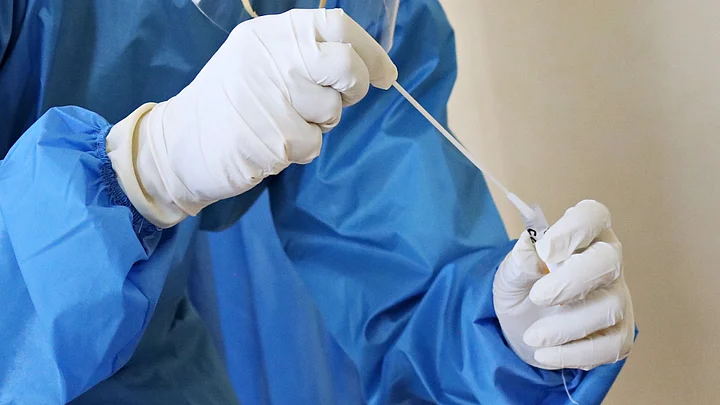As India was still grappling with the first wave, trying to prevent and fight off this new infection, reinfections of novel coronavirus were perhaps not the most urgent of our worries.
But as wave after wave continues to wash across the world, and with India reporting record-high numbers by the day, questions that previously occupied the back burner, have now become more urgent. One of these questions being that of reinfections.
A recent study by the Indian Council of Medical Research (ICMR) is the first of its kind to shed some light on this phenomenon in India.
The study, published in the Cambridge Epidemiology and Infection Journal, found 58 out of 1,300 individuals (4.5 percent) infected with COVID this time around had already been infected once before.
What should you know about COVID reinfections? Who is at risk? How long does antibody protection last? FIT breaks down the most-asked questions.
Why are COVID reinfections alarming?
When someone is infected with the SARS-CoV-2 virus, the body is able to retain the memory of the pathogens and create antibodies to fight the microbes if infected with them again, like in the case of measles, and chickenpox.
This phenomenon is especially important when it comes to creating vaccines against the illness.
But in August 2020, the first COVID reinfection was reported. The increase in the number of cases of reinfections popping up also coincided with the new mutated variants being traced.
If COVID reinfections are possible, it could prove to be a major setback to our collective fight against the pandemic. Apart from posing a major roadblock to our vaccination efforts, it would also mean that recovered patients continue to spread the virus.
Who is at the risk of getting reinfected with coronavirus?
According to Dr Swapneil Parikh, Internal Medicine specialist, and author of the book, The Coronavirus: What You Need To Know About The Global Pandemic, individuals who may not have an immune response as long-lasting as others, or those people who may not have been able to develop a robust immune response to the COVID virus are at a higher risk of getting reinfected.
A recent study published by the Lancet found that although reinfections are rare, those over the age of 65 are at a far higher risk.
Dr Parikh explains this further by saying, “the reason for this is thought to be because the immune response they developed to the infection is not as robust as the immune response developed by healthy young people.”
This is also true in the case of people with certain comorbidities such a thalassemia.
Though COVID reinfections were initially thought to be very rare, with time, more tests, and more studies, experts peg the likelihood of reinfections somewhere between 1 and 10 percent.
Are reinfections more severe?
Dr Swapneil Parikh who was part of a case series study — the first in the world to show that reinfections are likely to be less severe — explains:
“Most reinfentions are likely to be not so severe. But in a small subset of people these reinfections may be more severe.”Dr Swapneil Parikh
This is especially true in the case of persons who developed no or mild symptoms the first time around.
The ICMR study also points to certain cases of reinfection being more severe than the first one, saying “a large proportion of participants were asymptomatic and had higher CT value during first episode.”
This means that the severity of the reinfection will depend on your body’s preparedness to fight off the pathogens. A mild or asymptomatic infection may not lead to your body creating enough antibodies, or developing the memory required to fight off the virus more efficiently the second time around.
Can vaccination help?
Although vaccines are proven to effectively reduce the severity and even prevent infection, there is no definite data when it comes to the longevity of the protection rendered by the vaccine.
Though rare, there have also been cases of people catching COVID even after taking the vaccine.
Vaccination and natural infections are thought to protect a person from the infection for at least a few months, with Pfizer-BioNTech even releasing a statement saying their COVID vaccine provided protection for up to 6 months.
But once again, how long an individual is protected will depend on some variables, including their body's own immune response.
“Its very difficult to say right now how long immunity will last after vaccination. There are two components to that. One is how long will our immune response (memory and antibodies) lasts. Another is how fast is the virus able to change to beat our immune response.”Dr Swapneil Parikh
Dr Parikh goes on to explain that immunity following vaccination is likely to be more robust and lasts for longer (when compared to immunity following natural infection).
“Even though the antibody titers may go down after, the body still retains the memory of the pathogen, so in case of re-exposure, the immune response will develop quickly. So an individual may get infected but it’s unlikely to be more severe,” he says.
How can I prevent reinfections?
The answer to this question is pretty much the same as the prevention of the infection itself.
Even in the case of healthy younger individuals, they are advised to continue using masks and social distancing when in public as you could still be carriers who could infect other people who may be more vulnerable to reinfections.
Continue to practice COVID-appropriate behaviour even if you have been infected once and recovered, and also after getting vaccinated. Especially, if you are older and have other comorbidities.
(This article was first published on FIT.)
(At The Quint, we question everything. Play an active role in shaping our journalism by becoming a member today.)
